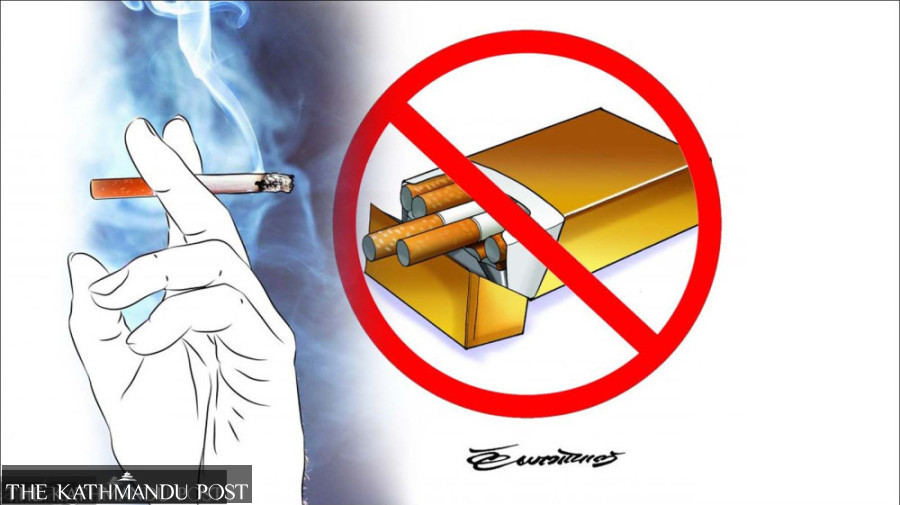Health
KMC suspends emission testing, enforces public smoking ban
Says testing will resume once a mechanical engineer’s contract is renewed. Smokers are fined Rs500.
Post Report
Emission testing of vehicles, both private and public, started by the Kathmandu Metropolitan City since January, has been suspended indefinitely, as the City Office failed to retain a mechanical engineer.
Officials said that emission testing cannot be carried out without the help of a mechanical engineer, and the contract of the previous engineer expired a month ago.
“We have suspended emission tests on Kathmandu roads for about a month,” said Jagatman Shrestha, traffic expert adviser at the Kathmandu Metropolitan City office. “We will resume testing once we renew the engineer’s contract.”
Random on-the-spot emissions testing of vehicles has long been a plan of the metropolis to tackle growing air pollution in the Kathmandu Valley.
Nepal’s air quality reaches hazardous levels several times a year, and the capital city often becomes the world’s most polluted metropolis.
The city office started carrying out emissions testing on January 13 in coordination with the traffic police, and the federal Department of Environment and the Department of Transport Management.
The test showed that around 80 percent of diesel vehicles—buses, micro-buses and tata pick-up trucks—on Kathmandu’s roads emit black smoke beyond permissible levels. Likewise, around 30 percent of petrol vehicles—cars and motorcycles—also failed the tests.
“The crackdown on polluting vehicles had shifted vehicle owners’ attitudes towards engine maintenance,” said Shrestha. “ After repeated warnings and fines, the percentage of polluting diesel vehicles had lessened to 60 percent and petrol vehicles to 10 percent.”
The metropolis carried out emission testing on over 3,000 vehicles on a random basis.
Although vehicle emission testing is mainly the responsibility of federal agencies, the constitution also mandates local governments to take measures to reduce pollution, officials say.
The metropolis has developed pollution control guidelines as per the KMC Environment and Natural Resources Protection Act-2021.
In the initial stage, the metropolis carried out testing for raising awareness and warned drivers and owners to maintain their vehicle engines to avoid fines and legal action, and had obtained written commitments from vehicles that failed initial tests.
Later, it slapped Rs1,000 fines on drivers of polluting vehicles for ignoring these warnings.
Metropolis officials say more problems have been found in vehicles older than 20 years. The government has announced several times its intention to ban vehicles older than 20 years throughout the country to reduce traffic congestion, air pollution, and road accidents caused by old vehicles. However, the decision has not yet been implemented.
Meanwhile, the City Office has started enforcing a ban on smoking in public places from Sunday.
“On Sunday, we caught 17 smokers and fined Rs500 each,” said Raju Nath Pandey, chief of KMC Police. “The total number of rule violators will be known only in the evening.”
The metropolis has deployed several teams of its security personnel to discourage smoking in public places.
The KMC had also launched an awareness campaign within its jurisdiction against smoking in public places before enforcing a ban.
A recent executive and municipal assembly meeting of the city office had decided to enforce a smoking ban in public places and fine violators Rs500.
The decision to ban smoking in public places is in accordance with Clause 42 of the Public Health Act, which the metropolis unveiled some two years ago.
Tobacco use is a major risk factor for non-communicable diseases (NCD), including cancers, cardiovascular diseases, chronic lung diseases and diabetes. It is the world’s leading cause of preventable deaths and kills nearly eight million people every year. It claims 1.6 million lives in the WHO South-East Asia Region, which is among the largest producers and consumers of tobacco products.
Studies show 28 percent of men and five percent of women in Nepal smoke tobacco, according to the final report of the Nepal Demographic and Health Survey-2022, a nationwide study carried out by the Ministry of Health and Population between January 5 and June 22 last year.
The study shows 17 percent of men smoke on a daily basis, while 11 percent occasionally do. Among men who smoke cigarettes, a majority (54 percent) smoke less than five cigarettes per day on average. More men use smokeless tobacco than women—35 percent versus three percent. Overall, half of the men (50 percent) and only seven percent of women in Nepal use any type of tobacco.
The growing use of new and emerging products such as Electronic Nicotine Delivery Systems/e-cigarettes and the social use of sheesha/hookah are additional challenges to tobacco control, experts say.
“A lot of people, especially parents of teenage children, have complained to us and asked to prohibit the sales and use of tobacco,” said Dhurba Kumar Kafle, deputy spokesperson at the city office. “Our decision to impose a ban on smoking will discourage people from smoking.”
According to the World Health Organisation, tobacco kills 27,137 people in Nepal every year.




 13.12°C Kathmandu
13.12°C Kathmandu














